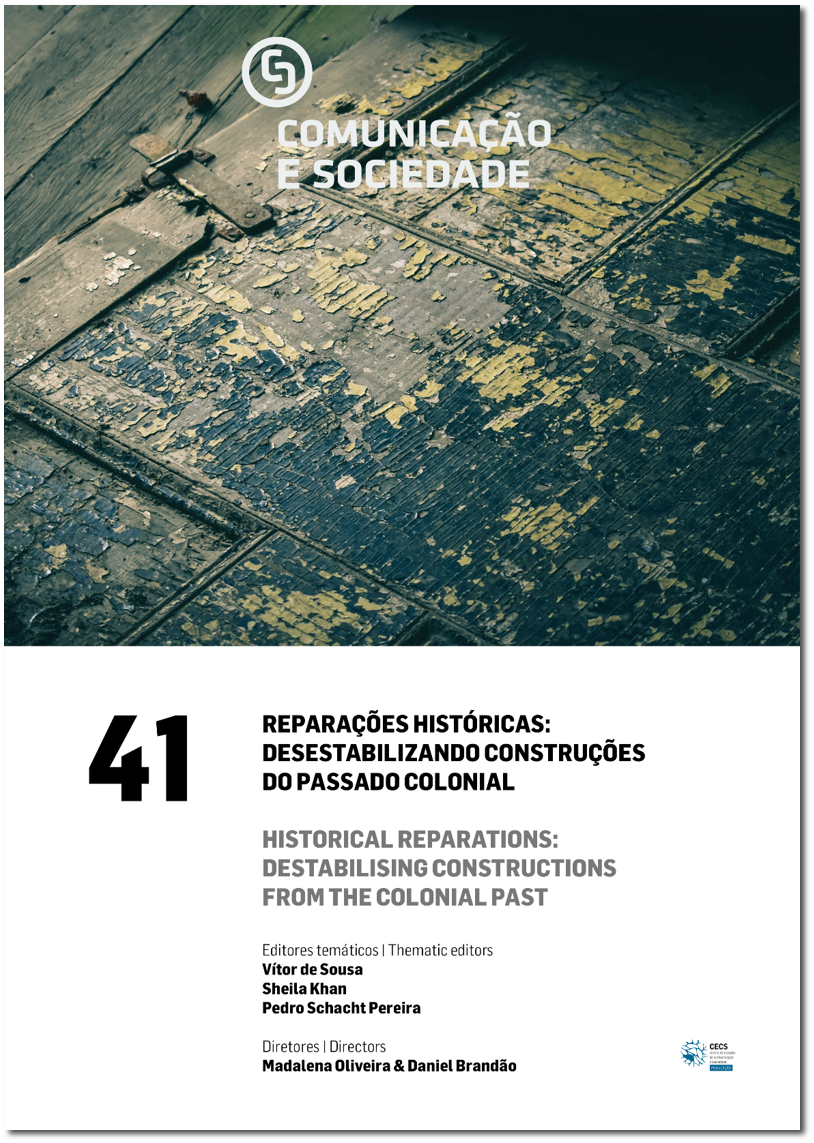Repairing History and the Wrongs of Its Agents in O Regresso de Júlia Mann a Paraty
DOI:
https://doi.org/10.17231/comsoc.41(2022).3663Keywords:
Black psychology, Sigmund Freud, Thomas Mann, Júlia Mann, memoryAbstract
In this paper, I analyse Teolinda Gersão’s most recent book, O Regresso de Júlia Mann a Paraty (Júlia Mann’s Return to Paraty, 2021), through the concept of Black psychology developed by Wade W. Nobles. I intend to further elaborate on one of the novel’s central questions, posed by Sigmund Freud, the father of psychoanalysis, whom Gersão (2021) turns into a fictional character-narrator: “can it be that we are unable to evolve in the ethical realm, just as we seem unable to love and feel compassion after all?” (p. 14). At the same time, dissect the wrongs of two of history’s most significant agents, both in the scientific and literary fields, the novel highlights. Intellectually influenced and influential, prominent figures in the history of literature, science, and thought in Gersão’s book were exposed for the same wrong: not critically questioning a world rooted in White hegemony, which erased the difference and dignity of the “other”. Drawing on Catherine Hall’s and Corinna McLeod’s work, among others, about writing history as a redressing process, I also demonstrate how O Regresso de Júlia Mann a Paraty engages in a critical and redeeming dialogue with the past reflected in the present.
Downloads
References
Allen, A. (2020). Critique on the couch: Why critical theory needs psychoanalysis. Columbia University Press.
Bastos, C. (1998). Tristes trópicos e alegres luso-tropicalismos: Das notas de viagem em Lévi-Strauss e Gilberto Freyre. Análise Social, xxxiii(146–147), 415–432.
Bastos, C. (2019). Luso-tropicalism debunked, again. Race, racism, and racialism in three Portuguese-speaking societies. In W. Anderson, R. Roque, & R. V. Santos (Eds.), Luso-tropicalism and its discontents (pp. 243–264). Berghahn Books.
Brooks, P. (1994). Psychoanalysis and storytelling. Wiley & Sons.
Burns, D. (2000). Feeling good. The new mood therapy. HarperCollins.
Caputi, N., Birnbaum, D., & Boller, F. (2018). Thomas Mann and neurology. In J. Bogousslavsky & L. Tatu (Eds.), Neurological disorders in famous artists (pp. 76–84). ProQuest.
Costa, S. F. (2021, 13 de março). Tempo sem ordem. Blimunda, 102. https://blimunda.josesaramago.org/o-regresso-de-julia-mann-a-paraty/
Dávila, J. (2019). Gilberto Freyre: Racial populism and ethnic nationalism. In W. Anderson, R. Roque, & R. V. Santos (Eds.), Luso-tropicalism and its discontents (pp. 45–67). Berghahn Books.
Eigler, J. (2005). Krankheit und Sterben. Aspekte der Medizin in Erzählungen, persönlichen Begegnungen und essayistischen Texten Thomas Manns. In von T. Sprecher (Ed.), Liebe und Tod – In Venedig und anderswo. Die Davoser Literaturtage (pp. 97–124). Klostermann.
Ellmann, M. (2014). Psychoanalytic literary criticism. Routledge.
Gersão, T. (2021). O regresso de Júlia Mann a Paraty. Porto Editora.
Hall, C. (2018). Doing reparatory history: Bringing ‘race’ and slavery home. Race & Class, 60(1), 3–21. https://doi.org/10.1177/0306396818769791
Hummel, G. (2006). Ein Sommernachmittag in Grinzing. Thomas Mann bei Sigmund Freud. Luzifer-Amor: Zeitschrift zur Geschichte der Psychoanalyse, 19(38), 76–101.
Khan, S. (2021a). A alquimia dos mecanismos de racialização, criminalização e vigilância racial. In H. Machado (Ed.), Crime e tecnologia: Desafios culturais e políticos para a Europa (pp. 151–170). Edições Afrontamento.
Khan, S. (2021b). Cartas, solidão e voz para uma pós-memória: Maremoto, de Djaimilia Pereira de Almeida. Abril, 13(27), 125–135. https://doi.org/10.22409/abriluff.v13i27.50266
Khan, S. (2021c). Um narcisismo colonial: Implicações históricas nas tecnologias de vigilância. Revista Ciências Humanas, 14(2), 54–62. https://doi.org/10.32813/2179-1120.2121.v14.n2.a743
Khan, S., Can, N., & Machado, H. (Eds.). (2021). Racism and racial surveillance. Routledge.
Khan, S., Sousa, V. de., & Ribeiro, R. (Eds.). (2020). O mundo na Europa. Crises e identidades. Húmus.
Lowe, L. (2015a). History hesitant. Social Text, 33(4 (125)), 85–107. https://doi.org/10.1215/01642472-3315790
Lowe, L. (2015b). The intimacies of four continents. Duke University Press.
Lowe, L., & Manjapra, K. (2019). Comparative global humanities after man: Alternatives to the coloniality of knowledge. Theory, Culture & Society, 36(5), 23–48. https://doi.org/10.1177/0263276419854795
Maldonado-Torres, N. (2008). A topologia do ser e a geopolítica do conhecimento. Modernidade, império e colonialidade. Revista Crítica de Ciências Sociais, (80), 71–114. https://doi.org/10.4000/rccs.695
Mann, T. (1936). Freud and the future. https://pdfcookie.com/download/freud-e-o-futuro-thomas-mann-x20gpnd0o9l3
McLeod, C. (2009). Negotiating a national memory: The British Empire & Commonwealth Museum. African and Black Diaspora: An International Journal, 2(2), 157–165. https://doi.org/10.1080/17528630902981209
Meneses, M. P. (2021). Desafios à descolonização epistêmica: Práticas, contextos e lutas para além das fraturas abissais. Contemporânea, 10(3), 1067–1097. http://hdl.handle.net/10316/95799
Mignolo, W. (2007). Delinking. Cultural Studies, 21(2), 449–514. https://doi.org/10.1080/09502380601162647
Miskolci, R. (2003). Uma brasileira: A outra história de Júlia Mann. Cadernos Pagu, (20), 157–176. https://doi.org/10.1590/S0104-83332003000100006
Nobles, W. (2013). Shattered consciousness, fractured identity: Black psychology and the restoration of the african psyche. Journal of Black Psychology, 39(3), 232–242. https://doi.org/10.1177/0095798413478075
Otis, L. (1991). The memory of the race: Organic memory in the works of Émile Zola, Thomas Mann, Miguel de Unamuno, Sigmund Freud and Thomas Hardy. University Microfilms International.
Paulino, S., & Soethe, P. (2009). Thomas Mann e a cena intelectual no Brasil: Encontros e desencontros. Pandaemonium Germanicum, (14), 28–53. https://doi.org/10.1590/S1982-88372009000100004
Quijano, A., & Wallerstein, I. (1992). Americanity as a concept, or the Americas in the modern world-system. International Social Science Journal, 134(4), 549–557.
Redondo, T. (2012). Freud e as letras. Pandaemonium Germanicum, 15(20), i–v. https://doi.org/10.1590/S1982-88372012000200001
Ribeiro, M. C. (2020) Arte e pós-memória – Fragmentos, fantasmas, fantasias. Diacrítica, 34(2), 4–20. https://doi.org/10.21814/diacritica.523
Royal Institute of International Affairs. (1942). Portugal during the War: II—Her overseas empire and shipping. Bulletin of International News, 19(21), 929–932.
Downloads
Published
How to Cite
Issue
Section
License
Copyright (c) 2022 Sandra Sousa

This work is licensed under a Creative Commons Attribution 4.0 International License.
Authors own the copyright, providing the journal with the right of first publication. The work is licensed under a Creative Commons Attribution 4.0 International License.











